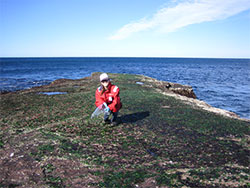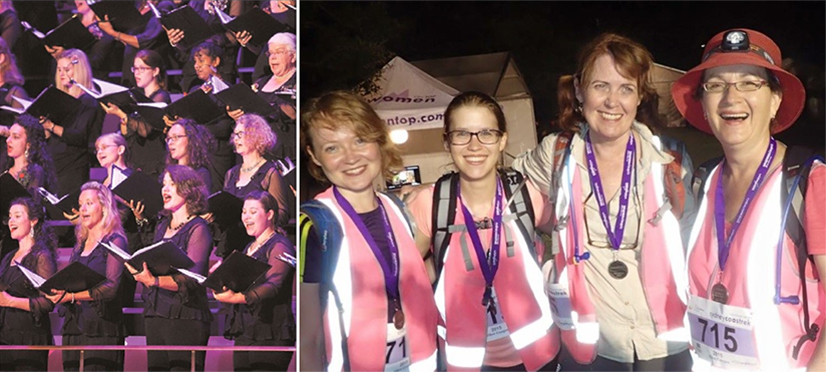
Chemist at ANSTO
Email: jvc@ansto.gov.au
I grew up in Sydney and after finishing school, I didn’t really know what I wanted to ‘be’. I enjoyed studying physics, chemistry and maths at school and my careers advisor spoke highly of the opportunities in science. I decided to do a Bachelor of Science (Advanced) at Sydney University, followed by honours in 2007. My project was in my favourite subject, chemistry, making cyclic peptides as anion sensors and doing binding studies. I enjoyed it but wasn’t ready to commit to a PhD, so I decided to try working in some other fields of science first.
In 2008 I started a graduate job at the Australian Nuclear Science and Technology Organisation (ANSTO). This involved working in environmental monitoring, consulting for mining companies, environmental research into food webs and studying self-assembling bacteria before I settled on my current area of research: making materials for selective elemental separations. I am so grateful I had the opportunity to try all these different jobs. Besides giving me the confidence that my current area of research is really where I want to be, I have some great stories about driving a Toyota Hilux to the local sewage treatment plant to collect sewage samples, or making pasta out of worms to feed to yabbies.
My research now involves making materials that can extract a single targeted element from a complex solution. To be effective in a nuclear context, these materials need to be tolerant towards acid and radiation. This research lets me combine all kinds of chemistry. I synthesise inorganic porous materials because they have the stability required for nuclear applications, then add organic molecules to make them selective for the target element. Then, I use physical methods to figure out the structure of what I have made. Plus, I use analytical chemistry to test the performance of the materials.
As well as being varied, I like my research because it has potential real life applications, such as treating nuclear waste or cleaning up water systems contaminated with radioactivity. I am most motivated by doing science that helps solve problems and makes a difference in critical areas like helping our environment. At the same time I believe that fundamental research purely for the sake of understanding things is also really valuable.
I was fortunate enough to be supported by ANSTO to study my PhD part-time while maintaining my job, because my PhD topic was in line with my ANSTO research. Under the supervision of Dr Tracey Hanley (ANSTO) and Professor Katrina Jolliffe (University of Sydney) I completed my PhD earlier this year.
Some of the highlights of the last five years include receiving the United Uranium Scholarship to work at the Argentine Atomic Energy Agency in Buenos Aires for three months, attending conferences such as the HOPE meeting with Nobel Laureates, going to ‘synchrotron school’ and staying awake for 48 hours straight during synchrotron experiments. Travel is one of the ‘perks’ of a career in science that can in reality be exhausting and very hard work. However, on some trips you get the chance to explore and have real cultural experiences, like seeing the stunning Perito Moreno glacier in Argentina, going on safari in South Africa or temple visits and tea ceremonies in Japan.

One of the hardest things during my PhD was not having as much peer-support because I was part time. Then of course there were the times when none of my experiments were working and I began to feel like it was all my fault and that I’d never finish! I’m sure this feeling is common but it’s not talked about much. It’s also hard getting knocked back for funding, travel or a paper because it can feel a lot like they’re saying ‘you’re not good enough’. You have to be confident in your own ability and just keep applying. Even when you are doing a good job, positive feedback and encouragement can be rare. For this reason I believe the people you work with are hugely important to your enjoyment of your job. As an introvert, I am not very good at ‘networking’, but I have always sought out supervisors and colleagues who are supportive of me and my career, and I look forward to more collaborations.
I also believe strongly in science communication, which is the key to getting the broader community to understand science and from there to value it. I think the trick is finding the balance between simplicity and complexity. I find it immensely satisfying when I tell someone who originally thought they would never be able to understand what I do (like my mum!) about my research and they understand it—they’re like ‘oh, I actually get it, that’s really interesting’ and I’m like ‘Yes! I know it is!’
As much as I enjoy my job, working too hard all the time makes me unhappy, so it’s important to do things that get my mind out of ‘work-space’. I sing with the Sydney Philharmonia choirs, so getting to rehearsals forces me to leave work on time and motivates me to be efficient while I am at work. Holidays, catching up with friends, reading and exercise are all important for my mental health too.
My final piece of advice when things get hard is to remember why you chose science. As a rule, people don’t choose a career in science research for the money or the prestige. We do this job because we love solving problems and creating new knowledge and continuously learning. Hold onto that.

© 2025 Australian Academy of Science